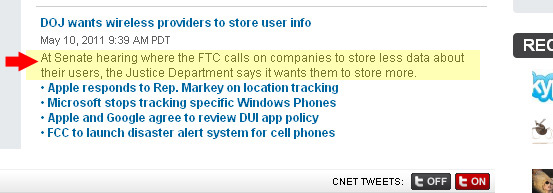WATCHING:
 Despicable MeChris Renaud, Pierre Coffin, directors
Despicable MeChris Renaud, Pierre Coffin, directors
This is a strange little animated movie that is not great, but it just works.
Highly formulaic story line (bad guy brought back from the dark side by cute little kids – trust me, I’ve spoiled nothing), but is saved by wonderful animation, unbelievably imaginative characters and attention to detail.
The weapons used in this movie would make Wiley Coyote salivate – from freeze guns to squid shooters, and rockets galore.
This is a “rent it” movie. Good fun for all ages, but not something I’ll return to again (as I will with just about any Pixar title).
All movies
Well, the presidential election isn’t for another 18 months are so, but the jockeying has begun. Obviously, this is really only pronounced for the non-incumbent party (the Republicans).
OK, I can see trying to appeal to certain constituencies, but sometimes it gets so absurd that it makes candidates/king makers hard to take seriously.
Take Mississippi Gov. Haley Barbour, who sat down for a radio interview with Bryan Fischer, a prominent voice of the religious right. They talked about the repeal of “Don’t Ask, Don’t Tell” (DADT), and Barbour – a potential Republican presidential candidate for 2012 – had this to say:
“[I]t’s not necessarily over homosexuality. It’s over the fact that when you’re under fire and people are living and dying of split-second decisions you don’t need any kind of amorous mindset that can effect saving people’s lives and killing bad guys. […]
“I think it ought to be rolled back. I just don’t see how you can take any other position if the person you are trying to protect is the soldier who is actually in combat.”
— DADT DEAD-ENDERS NEED TO GET OVER IT, WashingtonMonthly.com
Well, there is a lot wrong with Barbour’s statement, but – to me – what struck me was the “amorous mindset” phrase.
Here’s my thought – just as “there are no atheists in the foxholes” (William Thomas Cummings), there are “no amorous mindsets when under fire.” When you’re under fire (I have no experience with same), I would expect your thoughts are survival; saving your ass and those of your fellow soldiers – because if they are hit, your odds go down. With the bullets whizzing around, I don’t think there’s a lot of sexual tension. I don’t understand what Barbour was trying to say. I really don’t.
And how does re-instating DADT fix this “amorous mindset” problem? We’ll still have gays who are lusting after other gay/straight soldiers; but they’ll just be in the closet. And to really get rid of “amorous mindsets,” maybe we should get rid of women in the armed forces, as well, right? To keep the straight males focused.
Crazy.
And let’s back up to the radio program this was on – Bryan Fischer’s. His show has recently seen the likes of most Republican presidential hopefuls: Barbour, Huckabee, Michele Bachmann, Newt Gingrich, Tim Pawlenty and so on.
He’s big with the religious right.
And what are Fisher’s opinions on government and religion?
“Islam has no fundamental First Amendment claims, for the simple reason that it was not written to protect the religion of Islam. Islam is entitled only to the religious liberty we extend to it out of courtesy. While there certainly ought to be a presumption of religious liberty for non-Christian religious traditions in America, the Founders were not writing a suicide pact when they wrote the First Amendment.”
[…] Fischer took it a step further, calling Islam a “treasonous ideology” and adding that “from a constitutional point of view, Muslims have no First Amendment right to build mosques in America. They have that privilege at the moment, but it is a privilege that can be revoked.”
— Bryan Fischer: Muslims Have No First Amendment Rights, talkingpointsmemo.com
Now, I support Fisher’s right to say such. I don’t agree with him, and – hopefully – he’d be OK with my right to say same.
But he’s a big hitter – do the candidates really want to associate with this kind of hate-mongering? Fischer didn’t even leave wiggle room for Jews – most of the times issues like this come up, the talking points are that the US is “Judea-Christian” nation. Are synagogues OK?
I am deeply saddened by polarizing rhetoric that passes for reasoned discourse these days. Part of it is the 24-hour news channels – a lot of feeding the beast – but some comes down to simple pandering, where it is easier to say “All Muslims are terrorists” than make that point that, yes, some terrorists are Muslims. And some Muslims are political/business leaders helping the country. Just not as easy to put on a bumper sticker.
One of my favorite musical groups today (I just discovered them a year or so ago) are The New Pornographers. They took their name from a declaration by some conservative religious leader who declared (I’m paraphrasing) that “rock and roll is the new pornography.” They were rock and rollers, hence, the new pornographers. The religious leader meant this as a bad thing; the musical group took it lightly.
To me, the new pornography – in the bad sense (pornography here as pejorative term) – is the accept-no-gray, America is the land of opportunity (but only if you’re like me/believe what I do…), self-righteous, fact-adverse political/religious discourse/diatribes.
It’s hurting everyone. It’s vitriolic.


 Well, today marks the 10th anniversary of the opening of the first Apple store. (Read the
Well, today marks the 10th anniversary of the opening of the first Apple store. (Read the 

 According to
According to  Despicable Me
Despicable Me

 Tonight – about five to six hours from now – the 2011 Academy Awards show will get underway; here’s my list of the winners and why.
Tonight – about five to six hours from now – the 2011 Academy Awards show will get underway; here’s my list of the winners and why.